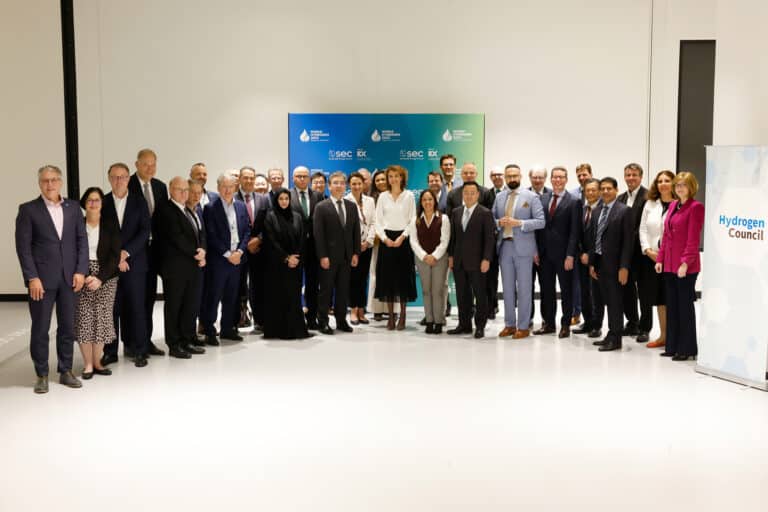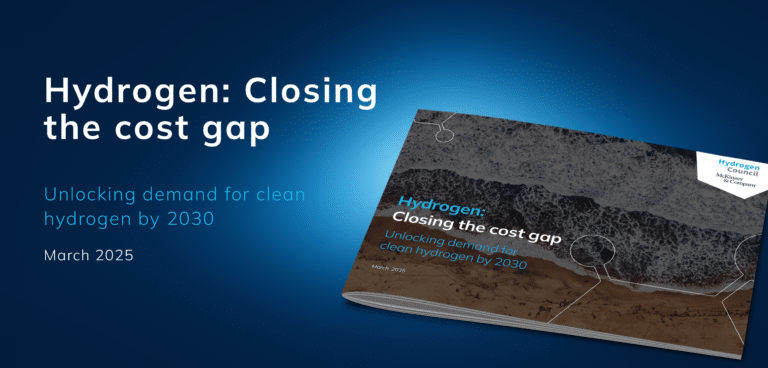BRUSSELS, November 16, 2023 – As we strive for a completely decarbonized world by 2050, the importance of hydrogen’s role in a transition to net zero has never been more evident. But in the face of a challenging economic landscape, and rising supply chain costs and constraints, the need to supply the world with the most competitive sources of clean hydrogen is paramount, a new Hydrogen Council summary report released today says.
The 2023 update of Global Hydrogen Flows, co-authored by McKinsey & Company, highlights the vital role global hydrogen trade will play in spurring hydrogen adoption and accelerating a more cost-effective transition to a hydrogen economy.
The summary report highlights how the hydrogen industry is adapting to an evolving regulatory framework, shifts in global policy, rising costs, and ongoing learning from project implementation. It revisits the 2022 Global Hydrogen Flows report to account for these and other changes, and assesses how global hydrogen trade flows could evolve.
The 2023 update of Global Hydrogen Flows finds that hydrogen trade will be even more important than thought before in supplying renewable constrained regions with access to clean molecules. The main hydrogen demand centers often do not align geographically with areas ideal for renewable hydrogen production. This creates potential trade opportunities between countries with surplus hydrogen production capacity at a low cost and those countries needing imports.
“Realizing hydrogen's key role in the energy transition requires thinking beyond borders. Connecting hydrogen supply and demand globally through trade will unlock major efficiency gains and cost reductions. We will continue working together to scale-up investment and infrastructure to unlock hydrogen’s full potential."
Sanjiv Lamba, CEO of Linde plc and Co-Chair of the Hydrogen Council Tweet
“By leveraging the potential of global trade, we can maximize clean hydrogen production in optimal locations and deliver it cost-effectively to demand centers. We need strong government support and cross-value chain collaboration to drive down costs and build out infrastructure for global hydrogen trade.”
Yoshinori Kanehana, Chairman of Kawasaki Heavy Industries, Ltd. and Co-Chair of the Hydrogen Council Tweet
Since the 2022 report, new regulations and production incentives such as the Inflation Reduction Act (IRA) in the US and the Renewable Energy Directive (RED III) in Europe have been introduced. These changes result in even larger clean hydrogen production cost differentials between geographic regions than previously thought, creating trade opportunities between countries with surplus hydrogen production capacity at a low cost and those countries needing imports. By 2030, the evolving hydrogen production cost profiles could result in a 15x cost differential between the highest and lowest cost regions.
Acknowledging the critical role hydrogen has to play for the world to decarbonize by 2050, there is an urgent need to accelerate efforts and investments to unlock trade, connecting suppliers and offtakers of clean hydrogen.
The 2023 analysis considers demand and trade in a scenario called Further Acceleration (FA), in which the energy transition is accelerated compared to today’s pace but the world still fails to reach below the 1.5°C temperature target. Under this scenario, demand for clean hydrogen (both low-carbon and renewable) could reach over 40 million tons per annum (MTPA) by 2030.
International trade will be crucial: around half of the clean hydrogen (both low-carbon and renewable) produced by 2030 is expected to be transported across long distances, according to the summary report. That is 20 MTPA out of 40 MTPA of total clean hydrogen demand. This transport will happen mostly via pipelines or shipments of clean ammonia replacing grey ammonia.
By 2050, clean hydrogen demand grows to 375 MTPA. Out of this, around 200 MTPA could be transported across long distances. By then, pipelines could account for around 40% of long-distance transportation, synthetic kerosene and ammonia another 20% each, shipped hydrogen (either via ammonia, LOHC, or LH2) 10%, with methanol and green steel accounting for 5% each.
Ensuring long-distance transportation of hydrogen and derivatives could result in significant cost savings and reduce carbon abatement costs. In a scenario where international hydrogen trade develops, total hydrogen investments could amount to approximately $8 trillion by 2050, representing $4 trillion in cost savings. To facilitate long-distance transport of hydrogen and derivatives, around $70 billion investments would be required per year by 2050 in transportation, conversion, and reconversion infrastructure.
Read the Global Hydrogen Flows 2023 Update summary report here.
About The Hydrogen Council
The Hydrogen Council is a global CEO-led initiative that brings together leading companies with a united vision and long-term ambition for hydrogen to foster the clean energy transition.
The Council believes that hydrogen has a key role to play in reaching our global decarbonization goals by helping to diversify energy sources worldwide, foster business and technological innovation as drivers for long-term economic growth, and decarbonize hard-to-abate sectors.
Using its global reach to promote collaboration between governments, industry and investors, the Council provides guidance on accelerating the deployment of hydrogen solutions around the world. It also acts as a business marketplace, bringing together a diverse group of 150 companies based in 20+ countries across the entire hydrogen value chain, including large multinationals, innovative SMEs, and investors.
The Hydrogen Council also serves as a resource for safety standards and an interlocutor for the investment community, while identifying opportunities for regulatory advocacy in key geographies.
To find out more visit www.hydrogencouncil.com and follow us on Twitter @HydrogenCouncil and LinkedIn.
Media Enquiries
Joanna Damerell, Communications Manager, Hydrogen Council



